What is mutual fund and how it will help you build wealth
Nowadays we see many ads around regarding mutual funds. "mutual funds sahi hai". Many people are already investing in it by the advice of their relatives or colleagues. Here we will try to understand what is a mutual fund? how it works and how it will help you build wealth.
What Is a Mutual Fund?
A mutual fund is a vehicle (in the form of a “trust”) to mobilize money from investors, to invest in different markets and securities, in line with stated investment objectives with professional fund management services offered by an asset management company.
Mutual funds are operated by professional fund managers, who allocate the fund's assets and attempt to produce returns for the fund's investors. A mutual fund's portfolio is structured and maintained to match the investment objectives stated in its related documents. Each investor owns units, which represent a portion of the holdings of the fund. The returns generated from this collective investment are distributed proportionately amongst the investors after deducting certain expenses (expense ratio), by calculating a scheme’s Net Asset Value or NAV.
The NAV (net asset value) is the market value of all the funds investments less liabilities and expenses, divided by the outstanding number of units for the firm.
The value of the mutual fund depends on the performance of the market securities it decides to buy/hold. So, when you buy a unit or share of a mutual fund, you are buying the performance of its portfolio or, more precisely, a part of the portfolio's value. Investing in a unit of a mutual fund is different from investing directly in stocks. Mutual fund units do not give their holders any voting rights as we get if we buy shares of the company. A unit of a mutual fund represents investments in many different stocks (or other securities) instead of just one holding.
The organizational structure of Mutual fund
A mutual fund is set up in the form of a trust. It started by a sponsor having certain eligibility ruled by SEBI. The sponsor appoints trustees.
The sponsor will have to appoint at least 4 trustees and if a trustee company has been appointed, then that company would need to have at least four directors on the Board. As per SEBI guidelines, At least two-thirds of the trustees on the Board of the trustee company would need to be independent trustees i.e. not associated with the sponsor in any way.
SEBI expects Trustees to perform a key role in ensuring legal compliances and protecting the interest of investors.
All Day to day operations of a mutual fund is handled by the Asset Management Company (AMC). The sponsor or, the trustees if so authorized by the trust deed, shall appoint the AMC with the approval of SEBI. The Compliance Officer works closely with the Trustees on various compliance and regulatory issues. It is the responsibility of the compliance officer to report any issue of non-compliance directly and immediately to the trustees.
Normally, the Fund management team can be broken into three sub-teams. The analysts, The fund managers, and The dealers. The analysts analyze various opportunities in securities, or sectors, or the state of the markets, or the economy. The fund managers evaluate the opportunities presented to them by the analysts, the brokers, and other research firms. The dealers place orders with securities brokers based on the instructions of the fund managers.
The SEBI Registered custodian has custody of the assets of the fund. As part of this role, the custodian needs to accept and give delivery of securities for the purchase and sale transactions of the various schemes of the fund. Thus, the custodian settles all the transactions on behalf of the mutual fund schemes.
Other functions are largely supported functions to run the AMC operations smoothly. These include Administration, Finance/Accounts, Human Resources (HR) and Development, Information Technology, Sales, and marketing team.
There are some support functions such as Fund accountant, Registrar, and Transfer agencies, Auditors, Distributors, Collecting bankers/payment aggregators, KYC registration agencies, Valuation agencies, credit rating agencies, Depositories, and the Depository Participant, Stock exchanges, and the transaction platforms.
Apart from this Association of Mutual Funds in India (AMFI) is the association of all the registered Asset Management Companies. A major role of AMFI involves the registration of mutual fund distributors, by allotting them AMFI Registration Number (ARN), which is mandatory for becoming a mutual fund distributor. Periodically, AMFI also issues various circulars recommending best practices for the asset management companies, as well as the distributors.
Types of Mutual Fund
Below are some categories of Mutual funds by structure, portfolio management and based on objectives.
We have different options to choose from while investing in Mutual funds such as Growth or Dividend (Payout/ reinvestment). Also if you go by yourselves it will be a Direct investment while if you go through an advisor/MF distributor, it will be Regular.
Benefits of How Mutual Fund and how it will help you build wealth,
- It is accessible and convenient for investing. All fund houses have their own website or many good Mutual fund Distributors are available to help you invest in Mutual funds.
- It has the potential to grow and the capability to beat inflation if invested with suitable objectives aligned with your goals and risk profile.
- It has liquidity. Most mutual funds are open-end with varied exit loads on redemption. In most cases, there is no exit load after one year. Mostly ELSS mutual funds come with a lock-in period of 3 years. The redemption request can be placed in just a few clicks, and the requests are processed quickly, unlike other investment options
- Mutual funds are well regulated. All mutual fund houses and mutual fund plans are always under the watch of the Securities and Exchange Board of India (SEBI) and Reserve Bank of India(RBI). Apart from that, the Association of Mutual Funds in India (AMFI), a self-regulatory body formed by all fund houses in the country, also governs fund plans.
- Mutual funds are subject to different regulation that ensures accountability and fairness to investors hence transparency in operation.
- Investing in ELSS (Equity Linked Savings Scheme ) fund provides you with the dual benefit of tax deductions and wealth-building over time. So you will get Tax saving benefits.
- You will get Professional Management. A primary advantage of mutual funds is investors don't have to pick stocks, study them and manage investments. Instead, a professional Fund manager takes care of all of this using extensive research and skillful trading. Investors often do not have the time, information access, or expertise to manage their own portfolios. A mutual fund is a relatively low-cost way for a small investor to get a full-time manager to manage their hard-earned money.
- Mutual funds provide economies of scale. Buying some stocks individually, the investor has to pay numerous commission charges needed to create a diversified portfolio. Buying only one security at a time leads to large transaction fees, which will eat up your returns. In a mutual fund, you will get a diversified portfolio in one fund at a lesser cost.
- A mutual fund gives flexibility in investing. You can start SIP (Systematic Investment Plan) with as minimum as Rs. 500. You can invest a lump sum or contribute monthly.
- Every Mutual fund has a predefined investment objective & category of risk. So the investor can choose to invest aligning their Risk profile and goals.
- Reducing risk in any investment talks about diversification. In a mutual fund, you will get it in different layers such as one fund contains many company's stocks. Also, you will have options like equity, debt, hybrid funds to invest in different diversified asset classes.
- The most notable advantage of investing in mutual funds is that you can invest a small amount regularly via a SIP(systematic investment plan). SIP gives you the flexibility to invest monthly, quarterly, or bi-annually, as per your comfort. You can initiate or stop a SIP as and when you want. Investing via SIPs eases the need to arrange for a lump sum to get started with your investment. SIP gives you the benefit of rupee cost averaging in the long run. When the markets fall, you automatically buy more units while you purchase fewer units when the markets are booming. There is no need to time the markets.
- In mutual funds, you get to benefit from the Power of compounding. You can understand about power of compounding from below table.
You can see how power of compounding works in Mutual fund investment if you regularly invest through SIP for certain period.
With help of an advisor, you can get your risk profile known to you. He can help you set your goals and allocate your money in diversified mutual fund types. By aligning your investment with financial goals and risk profile you have better chances to beat inflation and get respectable returns.
You can build your mutual fund portfolio which can be managed monitored and reviewed yearly.
Increasing investment progressively with a minimum of 10% per year in your SIPs will help you achieve your goals and financial freedom early.
If you found this article helpful, don't forget to share on social media and subscribe to blog for getting notification as new article get published.


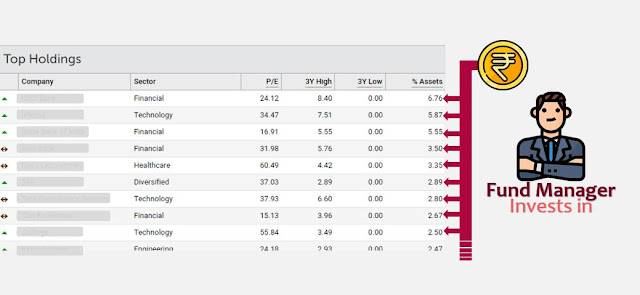
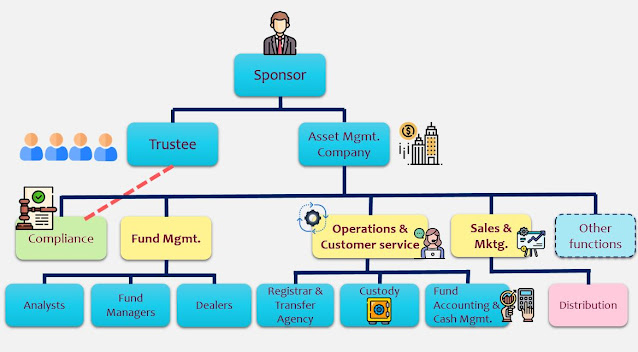
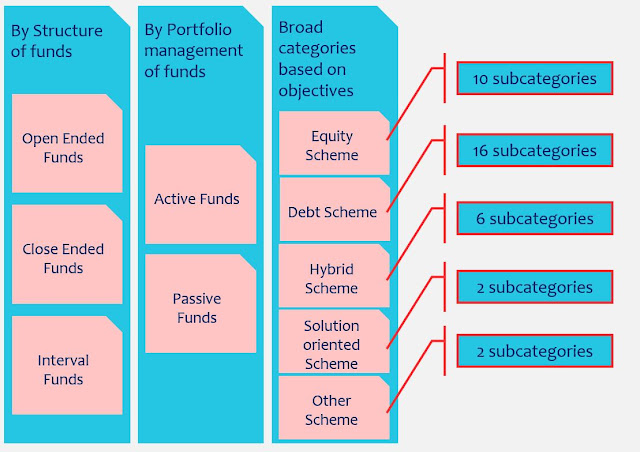


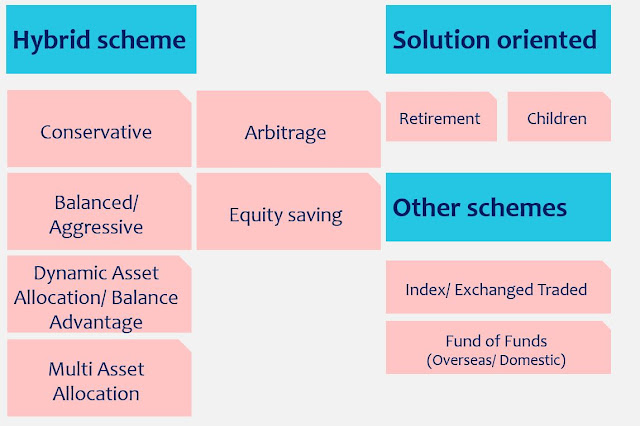
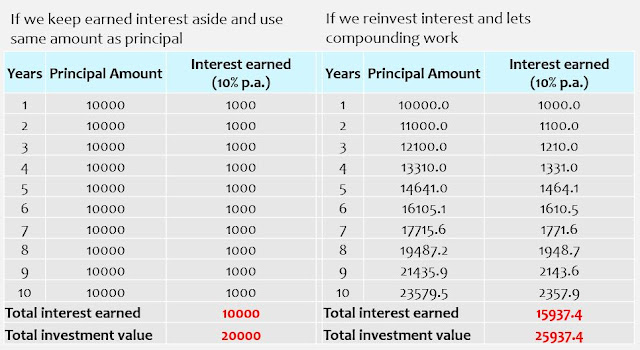

Post a Comment